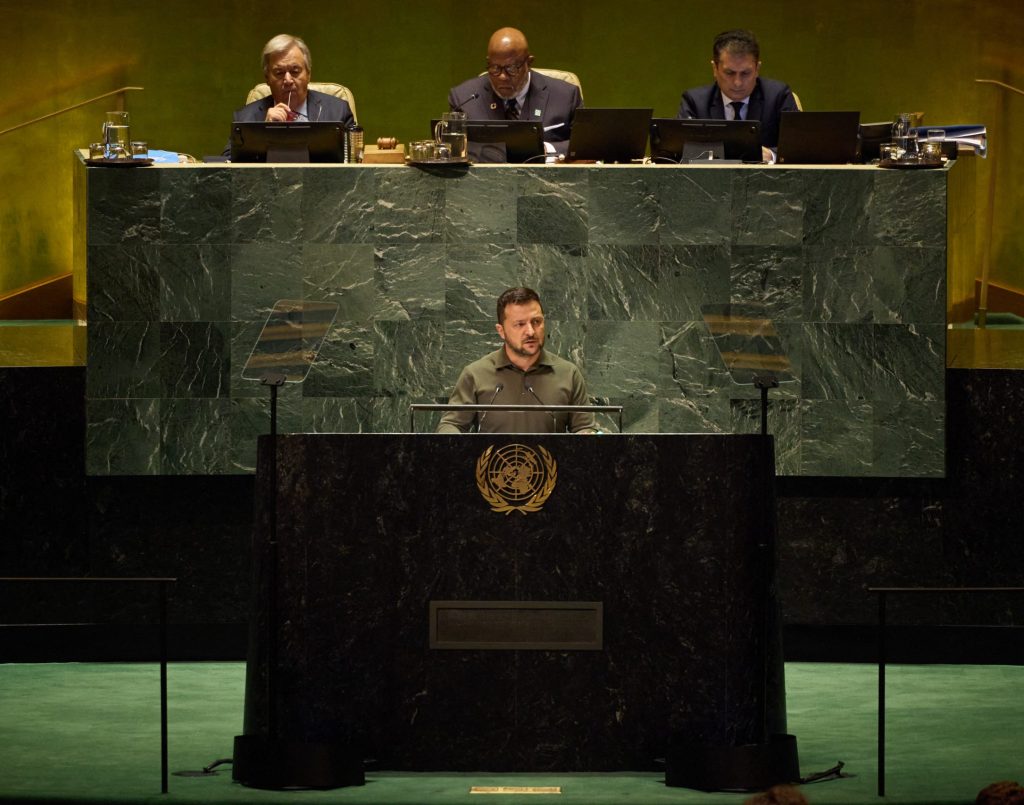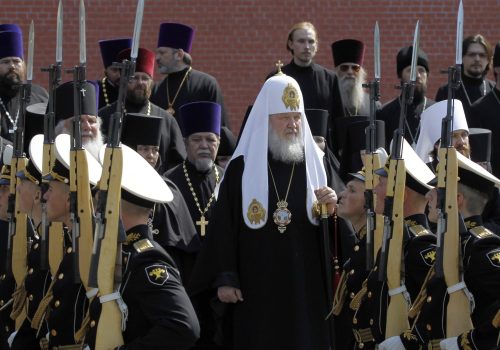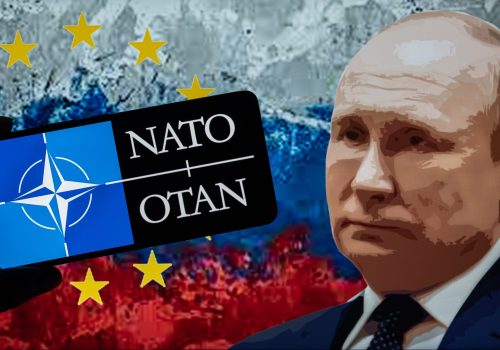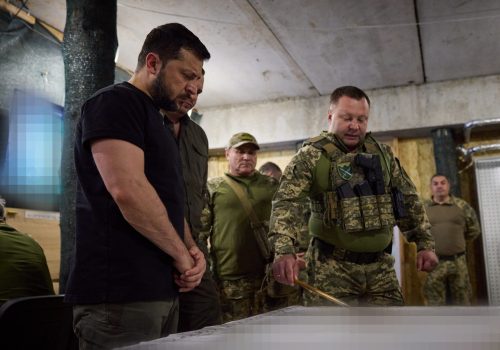Russia is committing genocide in Ukraine, Ukrainian President Volodymyr Zelenskyy told the United Nations General Assembly in New York on September 19. During his address, the Ukrainian leader spoke at length about the threats to global security posed by Russia’s full-scale invasion. Among the many war crimes Russia stands accused of, Zelenskyy highlighted the mass abduction and indoctrination of Ukrainian children. “This is clearly a genocide,” he stated.
Zelenskyy’s words made headlines, but it is not clear if UN officials were listening. Two weeks earlier, United Nations investigators in Kyiv confirmed that they had not yet conclusively established whether Russia is committing genocide in Ukraine. Erik Mose, who heads the UN’s Independent International Commission of Inquiry on Ukraine, informed journalists in the Ukrainian capital that while his investigation was ongoing, “as of now, we do not have sufficient evidence to meet the legal qualifications of the Genocide Convention.”
The cautious approach adopted by United Nations investigators sparked considerable anger and exasperation, but it is not entirely surprising. After all, the legal bar for determining genocide is necessarily high. Crucially, in order to confirm that a genocide is taking place, evidence of the relevant war crimes must be supported by conclusive proof of genocidal intent. In this case, efforts to demonstrate Russia’s genocidal intent will be bolstered by the unprecedented amount of genocidal rhetoric coming from senior Kremlin officials and regime propagandists in Moscow over a period stretching back at least fifteen years.
Russian President Vladimir Putin has set the tone for Russia’s viciously anti-Ukrainian public dialogue and has frequently engaged in what could be classed as genocidal language. He routinely asserts that Ukrainians are actually Russians (“one people”), and has repeatedly denied Ukraine’s right to exist while insisting the country is guilty of occupying “historical Russian lands.” In one particularly chilling recent outburst in September 2023, Putin denounced the “anti-human essence” of the modern Ukrainian state. Such dehumanization is widely recognized as an important indicator of genocidal intent.
Others throughout the Russian establishment have enthusiastically echoed Putin. According to research conducted by the Washington-based New Lines Institute and the Raoul Wallenberg Centre for Human Rights in Montreal, Russia’s state-orchestrated incitement to genocide includes “the denial of the existence of a Ukrainian identity” by senior Russian officials and state media.
Stay updated
As the world watches the Russian invasion of Ukraine unfold, UkraineAlert delivers the best Atlantic Council expert insight and analysis on Ukraine twice a week directly to your inbox.
The UN defines genocide as “the intent to destroy a national, ethnic, racial, or religious group, in whole or in part.” The five acts internationally defined as genocide include killings, causing serious harm, deliberately inflicting physically destructive conditions of life, imposing birth prevention measures, and forcibly transferring children to another group. Russia stands accused of committing all five acts against Ukrainians.
Evidence of Russian war crimes in Ukraine is extensive. An array of state and non-state international organizations have documented a vast amount of Russian crimes in Ukraine including the torture and execution of civilians and POWs, forced deportations, and the targeting of Ukrainian cultural, historical, and religious sites. Tens of thousands of Ukrainian civilians were killed during the Russian attack on Mariupol in spring 2022. Dozens of other Ukrainian towns and cities have since suffered similar fates.
The Kremlin began setting the stage for these crimes many years before the onset of the full-scale invasion in February 2022. According to the Just Security forum at the New York University School of Law, this process dates back to at least 2008 or 2009, and has been marked by “increasingly hostile language laying the groundwork for rejecting Ukraine’s existence as a state, a national group, and a culture.”
Even casual consumers of Russia’s mainstream media will be immediately familiar with this poisonous anti-Ukrainian agenda. Indeed, the demonization of Ukraine has long since become totally normalized throughout the Russian information space, with the Ukrainian authorities groundlessly portrayed as fascists and symbols of Ukrainian national identity routinely equated with Nazism. Russian television hosts and invited “experts” regularly talk of the need to destroy Ukraine.
Eurasia Center events

For more than a decade, Putin’s powerful propaganda machine has prepared the Russian public for the genocide they are now committing in Ukraine. This process has included the coordinated promotion of anti-Ukrainian messaging designed to rob the country of legitimacy and position it as an existential threat to Russia. Ukraine has consistently been portrayed as a failed state, an anti-Russian project devised by the West, and a puppet of anti-Russian forces. Meanwhile, the Ukrainian language and all other expressions of Ukrainian national identity have been derided as artificial and historically illegitimate.
This relentless flood of anti-Ukrainian propaganda appears to have conditioned the majority of Russians to accept the current invasion. Independent polls indicate overwhelming levels of public support for the war, despite widespread awareness of atrocities such as the destruction of entire Ukrainian cities and the deliberate bombing of Ukraine’s essential civilian infrastructure.
President Zelenskyy is not the only prominent figure to accuse Russia of committing genocide in Ukraine. Indeed, US President Joe Biden and his rival Donald Trump both did so during the early months of the invasion. More recently, US lawmakers visiting The Hague in September 2023 said Putin had “tried to erase a culture, a people, and a religion, and that is the definition of genocide.” They join a growing chorus of experts and academics who unambiguously state that Russia’s actions in Ukraine represent a genocide.
It will be some time before the United Nations and other relevant international bodies arrive at a definitive legal verdict on the genocide question. At this relatively early stage in the investigation process, the International Criminal Court has already issued an arrest warrant for Putin over the mass abduction of Ukrainian children, which itself likely qualifies as an act of genocide. As investigations progress, the role of Russia’s propaganda machine and the genocidal intent displayed by Kremlin officials including Putin himself will be closely scrutinized.
Dr. Taras Kuzio is a professor in the Department of Political Science at the National University of Kyiv Mohyla Academy and an associate research fellow at the Henry Jackson Society. His latest book “Fascism and Genocide. Russia’s War Against Ukrainians” was published by Columbia University Press this year.
Further reading
The views expressed in UkraineAlert are solely those of the authors and do not necessarily reflect the views of the Atlantic Council, its staff, or its supporters.

The Eurasia Center’s mission is to enhance transatlantic cooperation in promoting stability, democratic values and prosperity in Eurasia, from Eastern Europe and Turkey in the West to the Caucasus, Russia and Central Asia in the East.
Follow us on social media
and support our work
Image: Ukrainian President Volodymyr Zelenskyy addresses the 78th United Nations General Assembly at UN headquarters in New York City, NY, USA on September 19, 2023. (Photo by Ukrainian Presidency via ABACAPRESS.COM)




